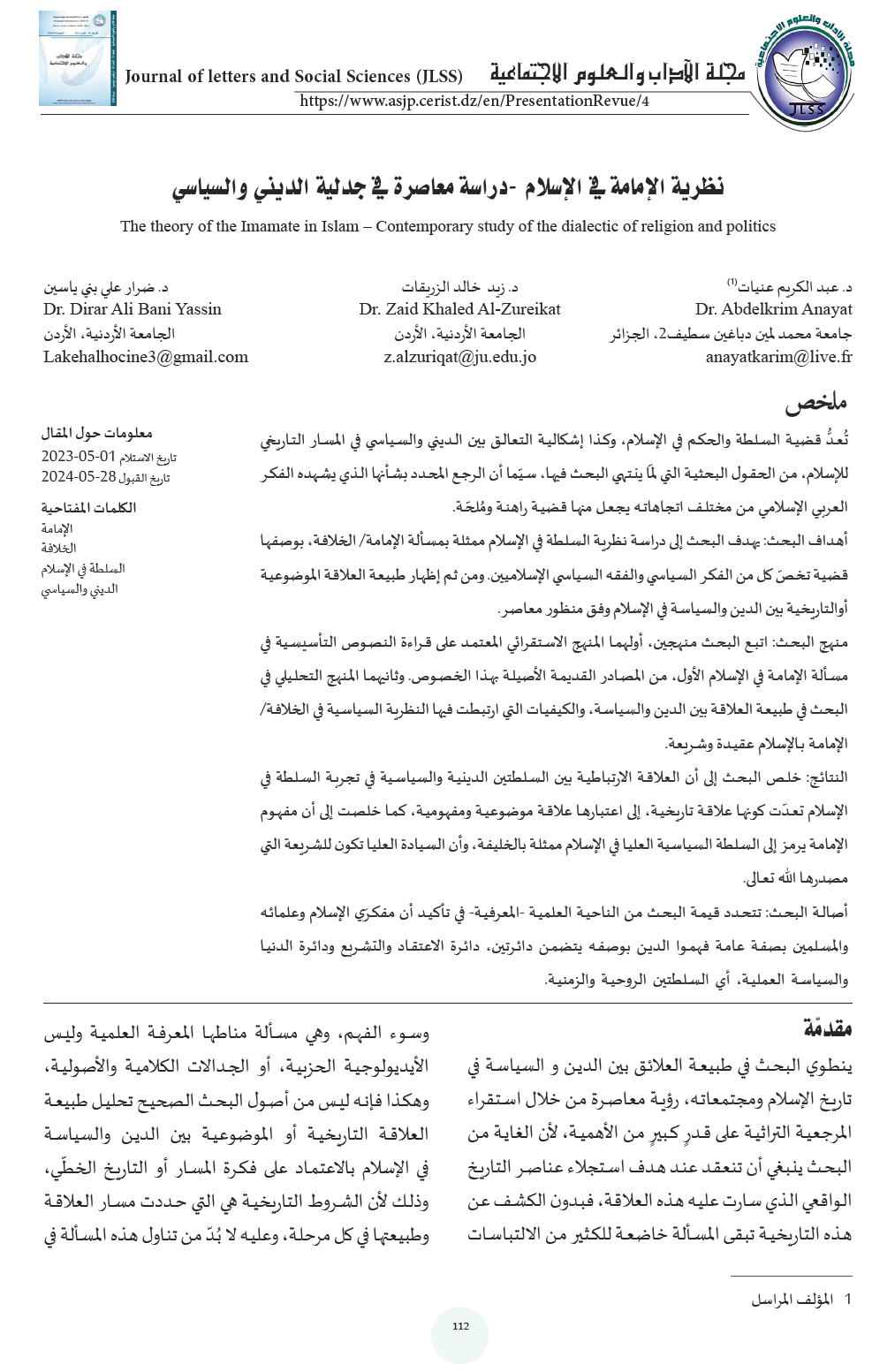The theory of the Imamate in Islam – Contemporary study of the dialectic of religion and politics
Article Information: Received 2023-05-01 ***** Accepted 2024-05-28
Keywords:
English
Imamate, Caliphate, Authority in Islam, Religious Thought, Political Thoughtالعربية
الإمامة، الخلافة، السلطة في الإسلام، الديني والسياسيFrançais
Imamat, califat, autorité dans l’islam, religieux et politiqueAbstract
English
It is of the opinion that, the issue of power and governance in Islam, as well as problem of the relationship between the religious and the political in the historical course of Islam, is one of the research fields which is not finished. This issue is especially appropriate since the specific references to the relation between religion and politics in Arab- Islamic thought, makes it a current and urgent issue.
Objectives: The research aims to study the theory of authority in Islam represented by the issue of the Imamate and the Caliphate, as an issue that concerns both political thought and Islamic political jurisprudence. And then to show the nature of the objective and historical relationship between religion and politics in Islam.
Research Methodology: The research followed two approaches, the first of which is the inductive approach based on reading the foundational texts on the issue of the Imamate in the formative era of Islam, from the original ancient sources in this regard. The second is the analytical method in researching the nature of the relationship between religion and politics, and the mechanisms that linked the political theory of the Caliphate to Islam as a belief and a law.
Results: The research concluded that the correlative relationship between the religious and political authorities in the experience of power in Islam went beyond being a historical relationship in order to consider it an objective and conceptual relationship. Its source is God Almighty.
The originality of the research: The value of the research is determined from the scientific-cognitive point of view in confirming that the thinkers and scholars of Islam and Muslims in general understood religion to include two circles, the circle of belief and legislation and the circle of worldly and practical politics, that is, the spiritual and temporal authorities.
العربية
تُعدُّ قضية السلطة والحكم في الإسلام، وكذا إشكالية التعالق بين الديني والسياسي في المسار التاريخي للإسلام، من الحقول البحثية التي لمّا ينتهي البحث فيها، سيّما أن الرجع المحدد بشأنها الذي يشهده الفكر العربي الإسلامي من مختلف اتجاهاته يجعل منها قضية راهنة ومُلحّة.
أهداف البحث: يهدف البحث إلى دراسة نظرية السلطة في الإسلام ممثلة بمسألة الإمامة/ الخلافة، بوصفها قضية تخصّ كل من الفكر السياسي والفقه السياسي الإسلاميين. ومن ثم إظهار طبيعة العلاقة الموضوعية أوالتاريخية بين الدين والسياسة في الإسلام وفق منظور معاصر.
منهج البحث: اتبع البحث منهجين، أولهما المنهج الاستقرائي المعتمد على قراءة النصوص التأسيسية في مسألة الإمامة في الإسلام الأول، من المصادر القديمة الأصيلة بهذا الخصوص. وثانيهما المنهج التحليلي في البحث في طبيعة العلاقة بين الدين والسياسة، والكيفيات التي ارتبطت فيها النظرية السياسية في الخلافة/ الإمامة بالإسلام عقيدة وشريعة.
النتائج: خلص البحث إلى أن العلاقة الارتباطية بين السلطتين الدينية والسياسية في تجربة السلطة في الإسلام تعدّت كونها علاقة تاريخية، إلى اعتبارها علاقة موضوعية ومفهومية، كما خلصت إلى أن مفهوم الإمامة يرمز إلى السلطة السياسية العليا في الإسلام ممثلة بالخليفة، وأن السيادة العليا تكون للشريعة التي مصدرها الله تعالى.
أصالة البحث: تتحدد قيمة البحث من الناحية العلمية -المعرفية- في تأكيد أن مفكرّي الإسلام وعلمائه والمسلمين بصفة عامة فهموا الدين بوصفه يتضمن دائرتين، دائرة الاعتقاد والتشريع ودائرة الدنيا والسياسة العملية، أي السلطتين الروحية والزمنية.
Français
La question du pouvoir et de la règle dans l’Islam, ainsi que le problème de l’interrelation entre le religieux et le politique dans le cours historique de l’Islam, font partie des champs de recherche dans lesquels la recherche ne s’arrête jamais, d’autant plus que la régression spécifique à son égard qui témoigne de la pensée arabo-islamique dans ses diverses directions en fait une question actuelle et urgente.
Objectifs de la recherche : La recherche vise à étudier la théorie du pouvoir dans l’islam représentée par la question de l’imamat/califat, en tant que question relevant à la fois de la pensée politique islamique et de la jurisprudence politique. Et montrer ensuite la nature de la relation objective et historique entre la religion et la politique dans l’islam.
Méthodologie de la recherche : La recherche a suivi deux approches, dont la première est l’approche inductive basée sur la lecture des textes fondateurs sur la question de l’Imamat dans l’Islam primitif, à partir des sources antiques authentiques à cet égard. La seconde est l’approche analytique dans la recherche de la nature de la relation entre la religion et la politique, et la manière dont la théorie politique du califat/imamat était liée à l’islam en tant que doctrine et loi.
Résultats : La recherche a conclu que la corrélation entre les autorités religieuses et politiques dans l’expérience du pouvoir dans l’Islam allait au-delà d’une relation historique, pour être considérée comme une relation objective et conceptuelle. Sa source est Dieu Tout-Puissant.
L’originalité de la recherche: La valeur de la recherche est déterminée du point de vue scientifique et cognitif en confirmant que les penseurs et les savants de l’islam et les musulmans en général comprenaient la religion comme comprenant deux cercles, le cercle de la croyance et de la législation et le cercle de la vie et de la politique pratique, c’est-à-dire les pouvoirs spirituel et temporel.

